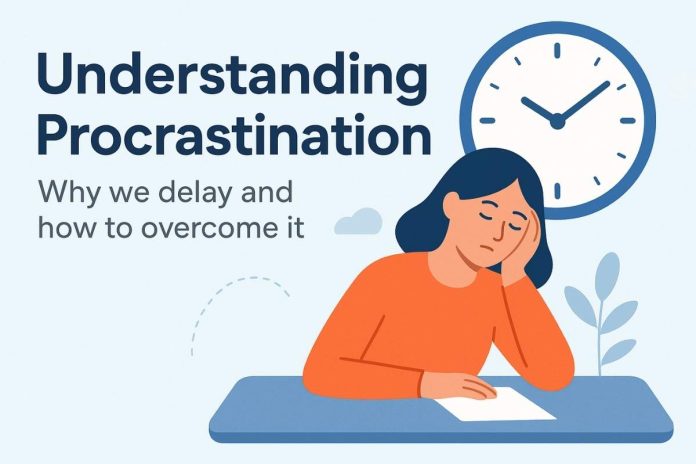If you’ve ever caught yourself uttering, “I’ll start studying tomorrow,” then you already have a sense of what procrastination feels like. Simply put, procrastination is putting off something you need to be doing right now. For students, this usually shows up as pushing away assignments, postponing revision, or telling yourself you’ll “start after five minutes” which somehow turns into hours.
When you start feeling like you are in your imagined world where you are the main protagonist of the story you are building in your head then surely you are procrastinating. But sometimes you get in the endless loop which becomes impossible to break and you waste a lot of time in that. But how to get out of that?
But before that the big question is why do we do this, even when we know it’s harmful? The answer lies in the way our mind works.
Why Do Students Procrastinate
Procrastination is less of an issue of laziness and more of a psychology, motivation, and habit issue. This blog will examine the psychological factors involved in procrastination, techniques for avoiding procrastination, and effective time management advice to keep students productive and avoid burnout.
1. The Pull of Instant Rewards
Our brain enjoys things that feel good in the moment such as scrolling through social media, watching reels, talking to friends and sometimes being in your head. Learning is not immediate gratification. Its future benefits, such as good grades or professional success. Since the brain focuses on now more than later, we procrastinate.
2. Fear of Failing
Most students shy away from beginning assignments because secretly, they fear that they will not pass. For instance, failing to prepare for an exam seems better than risking poor grades even if one tried. This fear-driven avoidance fuels procrastination and ends up sticking in a loop.
3. The Perfectionism Trap
If you wait for the “perfect time” to study or when your mood, energy, and environment all align you might never actually start. Perfectionism convinces students that unless everything is flawless, there’s no point in beginning as said there is no perfect time to start a work. It is your work that makes the time perfect.
4. Tasks That Feel Too Big
When the to-do list dictates “study the whole syllabus,” it’s daunting. The larger and more general the task, the more intimidating it is.
Procrastinators often believe they have more time than they actually do. This illusion of “I’ll do it later” keeps pushing work into the future until deadlines creep up, The brain chooses the easy way out, the avoidance.
5. A Distorted Sense of Time
Procrastinators often believe they have more time than they actually do. This illusion of “I’ll do it later” keeps pushing work into the future until deadlines creep up. You must have noticed when the holidays were about to end in those few days and you suddenly remembered a work you forgot to do, and then rushed through it.
How to Deal with Procrastination
The good news for you all is that procrastination is not permanent. Students can train their brain with small but effective strategies to stay on track. Let’s go through some proven methods:
1. Find Your “Why”
Before going into study mode, question yourself: Why does this concern me? Rather than thinking, “I must study because the teacher told me so,” recall your own reason if it’s to score well so as to continue higher studies, enhance confidence, or develop your future profession. Having a solid “why” makes the work meaningful and simpler to begin.
2. Try the Pomodoro Technique
One of the simplest focus hacks is the Pomodoro method. In pomodoro method you study for distraction free for 25 minutes without distractions and then take a 5-minutes break in between the study session. After four rounds you rest for 20-30 minutes. Breaking studying into smaller sprints not only makes it less scary, it keeps your brain refreshed and focused.
3. Break It Down
Rather than promising, “I will complete the whole chapter,” break it down into minor parts, such as reading 5 pages, summarizing main points, or solving 3 questions. Minor goals seem achievable, and their accomplishment boosts your confidence.
4. Build a Consistent Routine
Studying at random hours makes it easy to push things aside. Your brain doesn’t take it seriously and finds ways to make excuses. Instead, fix a daily slot, say 6 PM to 8 PM. Initially your brain will retaliate and struggle. But when your brain gets used to this rhythm, sitting down to study feels more natural and less of a struggle.
5. Cut Out Distractions
This is not a mystery how distraction plays a key role in procrastination in this day and age. Keeping your phone out of reach or using apps that block social media while you study can bring a drastic change. A clean desk with just the essentials, books, notes, water, etc can also make a big difference. When temptations are out of sight, focus becomes easier.
6. Use Smart Time Management
Managing time well reduces stress and prevents last-minute chaos. A few strategies are:
Eisenhower Box: Prioritize tasks by importance and urgency. Divide the task into four matrix, important and urgent, important and not urgent, not important but urgent and not important not urgent. This brings mental clarity and helps you study more, eliminating the feeling of overwhelm.
Time Blocking: Reserve fixed time slots for different activities, either online in the calendar or offline in a paper or pen. Allot a certain amount of time for tasks. This gives us the bigger picture as to how you spend your day and what your day consisted of.
Two-Minute Rule: If something takes less than two minutes, do it immediately instead of postponing. Not only does it give your brain dopamine hit, which encourages you more, it also helps you declutter your mental head space.
7. Gamify Your Studies
Make learning a fun competition. For instance, treat yourself after the completion of a section, perhaps a snack, music time, or brief game as a reward. Some learners utilize apps awarding points for work done, and the process becomes a game rather than a chore. Take your study session as a challenge, set the timer and challenge yourself. Your brain loves games and more so will actually start to like studying, which will definitely be followed by the ultimate reward of getting good grades.
Time Management Tips for Students
Overcoming procrastination isn’t just about fighting laziness, it’s also about creating systems that make studying easier. Here are some additional tips:
1. Plan Ahead
Write down 2–3 important tasks for the next day every night. This way, you start with clarity instead of wasting time deciding what to do. Deciding what to do in advance will leave you more time to study and focus on the specific things rather than making a chat then and there and tiring your 25min focus. Planning ahead also saves your mental energy, giving you a fresh start. This is also referred to as ‘decision fatigue’. Not only do you waste your time deciding, but you are confused about where and how to start.
2. Give Yourself Deadlines
Even if your teacher hasn’t set one, create a personal deadline. Self-imposed limits build urgency and keep you accountable. And do remember to award or punish yourself after completing or not completing the task on time. This will create a sense of fear of losing or pride of gaining something. Absence of deadlines gives us the illusion of an endless stream of time. Setting deadlines is not just an efficient time-management hack but also holds you accountable.
3. Do Harder Tasks First
When your energy is highest, usually in the morning, tackle the most challenging work. Save easier tasks for later in the day as it not only gets important things done but also saves a huge chunk of time. Very often you must have noticed how you end up using most of your energy doing trivial things, leading to low energy for the important tasks. Doing harder tasks not only helps you utilise your energy better, but you also get done with it early in your day.
4. The “Five-Minute Start” Rule
Studies have shown that the fear of the result often stops us from getting started. Starting a task makes you feel overwhelmed. Just promise yourself to study for 5 minutes. Most of the time, once you begin, momentum carries you forward. The trick is simply to begin.
5. Take Breaks and Rest Well
Students often confuse productivity with nonstop studying. In reality, rest is essential. A tired brain finds excuses to procrastinate. Good sleep, exercise, and mindful breaks improve focus and reduce delays.
Conclusion
Procrastination is not only a common problem for students, but it hinders and shatters confidence in oneself. But always remember it doesn’t define your abilities. It’s simply your brain trying to escape discomfort and chase easy rewards. Recognizing the reason underlying this behaviour is the first step you can take towards it.
By learning the psychology behind it and following simple strategies such as the Pomodoro technique, splitting tasks into small components, and time management, you can gain control over your habits.
The next time you get the urge to procrastinate, keep your larger “why” in mind, cut out distractions, and just begin small. It will create habits and momentum over time that turn into consistency and achievement.
Ultimately, overcoming procrastination for students is about progress, not perfection. Each time you choose action over procrastinating, you move one step closer to your goals and your future self will thank you for your effort.
Also Read: The Science Behind Effective Study Habits: Boost Your Learning Efficiency





